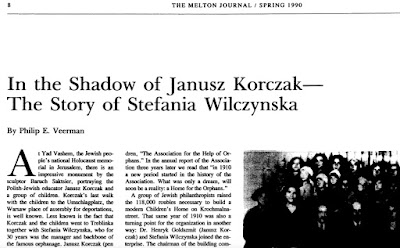 |
| Top row - in the middle Janusz Korczak and three teachers/bursa student. On the right Korczak´s assistant Stefania Wilczyńska. Lower picture Stefania Wilczyńska signature as house mother. |
There are many ways in which worrying about gender bias can affect the truth. I am thinking, among others, about Stefania Wilczyńska. After publishing of the book in 2015, "Pani Stefa", by Magdalena Kicińska, there was a rush by media to suddenly glorify Stefa, 70 years after the end of WWII.
Media was writing about Stefa as "the one who came out of the shadows" which is true. I am wondering, however, what is a fair and truthful place in history for Stefa? Was she in the shadow, or at par with Janusz Korczak where many gender enthusiasts are trying to place her? It appears that Magdalena Kicińska's book appeared just at the time when the preoccupation with gender bias achieved its nadir and it might have colored the work.
Is remaining in the shadow a fair place for Stefa Wilczynska or should her role be upgraded?
When Korczak became the director of the new orphanage on Krochmalna Street, he appointed Stefa as his assistant and house mother. At the orphanage, Korczak and Stefa complemented one another. However, from the bursa students testimonies we learn clearly that it was Korczak who provided intellectual, scientific and philosophical fundaments for their work while Stefa acted as faithful executor of his programs and a skillful enabler through fundraising.

